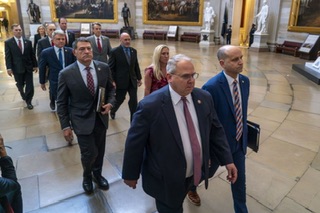
Since the US House Republican-led show isn't going well, they sent in the clowns, in other words, let's try these jokes.
The show's best-known and Sondheim's biggest hit song was almost an afterthought, written several days before the start of tryouts.
it means to act stupidly to make other people laugh: to clown around when all hope is gone. Some folks always want to know, when listening to a song, what the end is going to be, so "Send in the Clowns" didn't settle in until the end is near, "Don't bother, they're here",
The song is often interpreted as a reflection on missed opportunities and the complexities of relationships. The lyrics suggest a sense of regret and disappointment, as well as a wistful acknowledgment of the ironies and absurdities of life. The phrase "send in the clowns" itself is used metaphorically to highlight the surreal or farcical nature of a situation. It has been covered by numerous artists and has become a popular standard in the world of music.
Frank Sinatra, Bing Crosby, Kenny Rogers, Grace Jones, and Barbra Streisand have all covered the song, which Sondheim originally wrote for 1973's A Little Night Music. But it was Judy Collins' version that earned the song a major Grammy Award in 1976, enshrining it in musical theater and pop music history.
https://youtu.be/8L6KGuTr9TI?si=tPksk7rRDHhiAe-E
Meanwhile, believing or investing in DJT stocks can be a rollercoaster, especially when it involves a company with significant public and political interests like the Trump Media and Technology Group (TMTG). The comments you've shared illustrate the range of sentiments among investors, from unwavering faith to growing concern.
It's clear that some investors are deeply committed to the success of TMTG, viewing it as more than just a financial investment but as a symbol of their support for former President Trump and his vision. They express confidence that sticking with the stock will ultimately pay off, even in the face of significant losses and ongoing challenges.
Others, however, are questioning the downward trend in TMTG's stock price and expressing doubt about its prospects. The comparison to high-growth tech companies suggests that some investors may be hoping for a similar trajectory, despite the fundamental differences in the companies' financial performance and market positioning.
Trump's reassurance about the company's liquidity may provide some comfort to investors, but ultimately, the financial realities of TMTG cannot be ignored. The significant revenue shortfall and substantial losses reported by the company highlight the challenges it faces in establishing itself as a viable player in the media and technology landscape.
The heavy short interest in TMTG suggests that many investors are betting on further declines in its stock price, perhaps based on their assessment of its financial health and prospects. Short-term price movements aside, the long-term success of TMTG will likely depend on its ability to generate sustainable revenue growth and achieve profitability.
Investing always carries risks, and it's essential for investors to carefully consider the factors influencing a company's performance before making decisions. While faith and optimism can be powerful motivators, they should be balanced with a realistic assessment of the company's fundamentals and market dynamics.